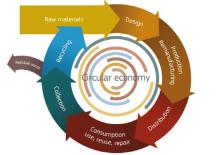The
The next Council work programme as established by the future Irish, Lithuanian and Greek Presidencies of the
The main policies of sector interest are:
Environment
Within the wider umbrella of sustainable development, environment will continue to be on the forefront of the EU agenda with a continuing emphasis on green growth and resource efficiency.
The adoption of the 7th Environment Action Programme, closely associated with the Resource Efficiency Roadmap, remains a priority.
Developing and reviewing environmental legislation will be one of the focuses of the three EU Presidencies, including:
• Review of the waste legislation (including targets);
• Review of the air policies;
• Water and the Blueprint will be at the core of the programme, and
• Review of the Environmental Impact Assessment Directive.
Protection of biodiversity and ecosystem services as well as conservation and management of natural resources will also be high on the agenda of the three EU Presidencies.
Related new legislative measures on invasive alien species will be progressed and also will seek to advance the implementation of the broader EU Biodiversity Strategy objectives and corresponding targets within the EU.
Employment
The three EU Presidencies will pursue the implementation of the 2012 Employment Package, putting emphasis on quality job creation, structural reform of labour markets and investment in human capital.
As for legislative activities, the EU Presidencies will continue working on:
• The Commission proposals on the review of the Working Time Directive;
• A new Community Strategy on Health and Safety at Work for 2013-2020;
• A new legislative instrument regarding occupational diseases of the musculoskeletal system, and
• A legislative initiative to amend the Directive 2004/37/EC on the protection of workers from the risks related to exposure to carcinogens or mutagens at work.
Transport
Furthermore, the three upcoming EU Presidencies will take forward the work on the proposal for the revision of the Directive on weights and dimensions aiming at improving aerodynamic characteristics of trucks and at changing their dimensions.
They will also examine the ‘internal road market package’ including legislative proposals on cabotage (access to road haulage market and access to the occupation of road transport operator), and on minimal rules on sanctions and their enforcement in commercial road transport and on charging systems for heavy goods vehicles.
These initiatives will be aimed at improving the economic and environmental efficiency of road freight transport and creating a more even playing field.
Several new proposals are expected to be presented which aim to improve the implementation of the European Maritime Transport Strategy.
Innovation
The Council has underlined the need for the European Innovation Partnerships (EIPs) to have a clear focus, the importance of Member State involvement and the need for effective streamlining of existing instruments.
Regular monitoring by the Council will be necessary in order to reach long term objectives as well as concrete goals to be fixed year by year.
SMEs
The EU Presidencies are looking forward to possible new
In future, efforts will be focused mainly on cutting bureaucracy, facilitating access to finance, supporting business’ access to new markets and stimulating entrepreneurship.
The EU Presidencies will also ensure the necessary follow-up to the Entrepreneurship Action Plan to be launched by the Commission at the beginning of 2013.
The adoption of the Regulation establishing a Programme to enhance the competitiveness of enterprises and small and medium-sized enterprises (COSME) is equally a priority.
Next steps
UEPG will identify the key meetings and proposals from the Irish Presidency in close cooperation with its Irish Member, the ICF.









